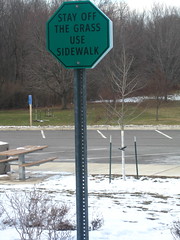 Mike Arauz is one of the most considered bloggers that I read regularly … but he has a bee in his bonnet about the term “social media”. It’s not that he doesn’t love it, it’s that he feels it’s being destroyed or desaturated of meaning. His Passionate Rant About Social Media reads, to me, like a manifesto of social media blame – and there is plenty to share:
Mike Arauz is one of the most considered bloggers that I read regularly … but he has a bee in his bonnet about the term “social media”. It’s not that he doesn’t love it, it’s that he feels it’s being destroyed or desaturated of meaning. His Passionate Rant About Social Media reads, to me, like a manifesto of social media blame – and there is plenty to share:
I blame everyone who claims to be a social media expert when no one can even begin to imagine what social media is going to become.
I blame everyone who says social media when they really just mean Facebook.
I blame everyone who asks for a social media marketing strategy when they really want a mass-media strategy without having to pay for it.
I blame everyone who treats social media like a game to be won by getting more followers.
I blame the mass media journalists who write and produce story after story about the latest buzzwords without ever bothering to even attempt to understand what the hell they're even talking about.
Take the time to read through the whole post. And then, think about WHY you or your brand is considering social media and then reframe your approach. Consider HOW you might begin to walk a shared desire path with your customers – and then, maybe, you will avoid the blame game altogether.
There are definitely a lot of people who fall into all of those categories. But a large part of that is just the fact that all of this has gone so mainstream. Just like anything else there will be people who use it “right” and those who use it “wrong”, if there even is a right or wrong.
And that’s the tough thing. Social media was developed with no rules so who can really blame people for not knowing what to do.
At the moment I’m ticked off by the fact that the same people shouting that you must let go of control to truly embrace social media are the same people trying to control how you interact with them.
my ramble is here: http://sociotequetangent.wordpress.com/2009/03/27/control/
Neat blog, thanks for the link.
With social media, the rules are generally set by the communities that form. Of course, if you don’t like the message you are getting, you can always opt-out. That’s the beauty of it.